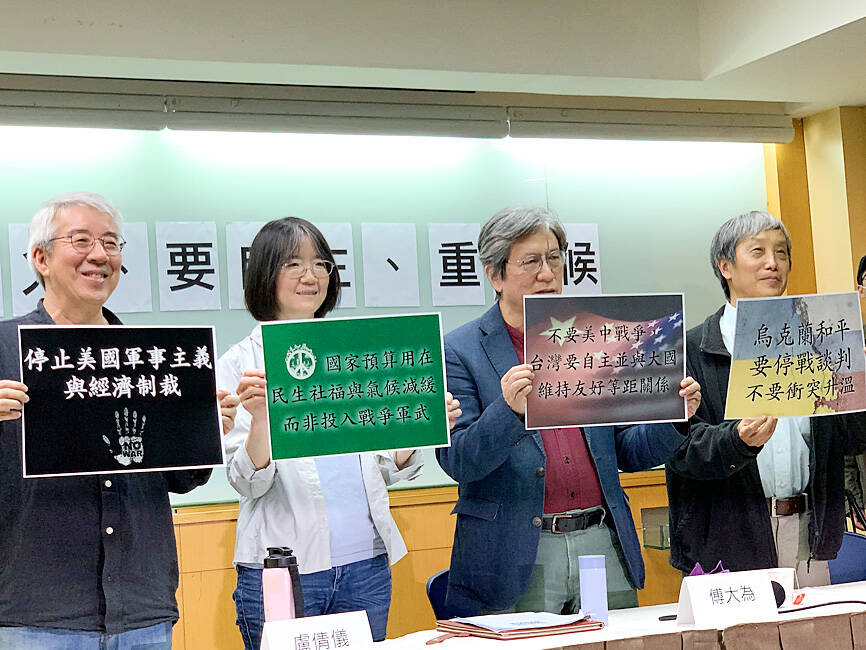Taiwan should work toward averting a US-China war by maintaining positive ties that are equally centered between both countries, an anti-war group of 37 active and retired academics urged in a statement.
The document, which discussed global issues along with Taiwanese matters, was initiated by National Yang Ming Chiao Tung University professor emeritus Fu Daiwei (傅大為) and presented at a news conference on Monday.
It appealed for a ceasefire in Ukraine, along with negotiations to stop the war; an end to “American militarism and economic sanctions” against Russia; and for Taiwan to focus on social welfare and climate change mitigation, rather than on military and war spending.

Photo courtesy of the Taiwan Anti-war Statement Working Group via CNA
The statement also said that to avert a war between the US and China, Taiwan should maintain positive and “equidistant” relations with both countries.
China’s constant threats against Taiwan were driven in large part by US “provocations” and Taiwan’s “knee-jerk” support for its programs and initiatives, Fu said.
This pattern has become a cycle, and Taiwan should adopt a policy of “equidistant diplomacy,” or signaling of neutrality, toward the two superpowers to lower the risk of war, he said.
Lu Chien-yi (盧倩儀), a research fellow at Academia Sinica’s Institute of European and American Studies, said that US militarism has come at a significant cost to its own people, citing cuts to social services, crumbling infrastructure and a drop in life expectancy.
“If politicians in Taiwan try to imitate these cuts to social welfare and the climate change budget, should we just blindly accept it?” she asked.
Taiwanese use a “strange logic” to describe China as the only threat, Lu said, adding that this “dangerous habit” has been reinforced by government officials who try to tamp down public skepticism of the US.
While China wants to “swallow” Taiwan, the US could end up “sacrificing” Taiwan in a potential war, and neither outcome is better than the other, Lu said.
Feng Chien-san (馮建三), a professor at National Chengchi University’s (NCCU) College of Communications, made a similar statement about the situation in Ukraine.
He said that Russia’s invasion of Ukraine was “an ignorant crime,” but the responsibility for the suffering and continued bloodshed was not Russia’s alone.
The US and its allies pushed for NATO’s eastward expansion when they knew this had been a long-time red line for Russia, and have blocked efforts to reach a diplomatic ceasefire since the war began, he said.
Retired NCCU communications professor Kuo Li-hsin (郭力昕) said that while the group’s statement is bound to provoke strong opinions, he hopes it provides a starting point for public debate.
“In a society that prides itself on democracy and freedom of speech, we hope there can be more deep thought and dialogue” on the issues that it raises, he said.
Some commentators said that the statement was excessively tolerant toward China.
Representative to Germany Shieh Jhy-wei (謝志偉) wrote on Facebook that the academics had their antiwar message “backward,” as the real threats of aggression and invasion come from Russia and China.
Wu Hsin-tai (吳欣岱), head of the Taipei chapter of the Taiwan Statebuilding Party, criticized the academics for promoting “naive appeasement” of China, while turning a blind eye to its aim of annexing Taiwan.

The Ministry of Economic Affairs has fined Taobao NT$1.2 million (US$36,912) for advertisements that exceed its approved business scope, requiring the Chinese e-commerce platform to make corrections in the first half of this year or its license may be revoked. Lawmakers have called for stricter enforcement of Chinese e-commerce platforms and measures to prevent China from laundering its goods through Taiwan in response to US President Donald Trump’s heavy tariffs on China. The Legislative Yuan’s Finance Committee met today to discuss policies to prevent China from dumping goods in Taiwan, inviting government agencies to report. Democratic Progressive Party Legislator Kuo Kuo-wen (郭國文) said

The Ministry of Economic Affairs has fined Taobao NT$1.2 million (US$36,900) for advertisements that exceeded its approved business scope and ordered the Chinese e-commerce platform to make corrections in the first half of this year or its license would be revoked. Lawmakers have called for stricter supervision of Chinese e-commerce platforms and more stringent measures to prevent China from laundering its goods through Taiwan as US President Donald Trump’s administration cracks down on origin laundering. The legislature’s Finance Committee yesterday met to discuss policies to prevent China from dumping goods in Taiwan, inviting government agencies to report on the matter. Democratic Progressive Party

Taiwan and its Pacific ally Tuvalu on Tuesday signed two accords aimed at facilitating bilateral cooperation on labor affairs, according to Taiwan’s Ministry of Foreign Affairs (MOFA). The governments inked two agreements in Taipei, witnessed by Foreign Minister Lin Chia-lung (林佳龍) and visiting Deputy Tuvaluan Prime Minister Panapasi Nelesone, MOFA said in a news release. According to MOFA, the agreements will facilitate cooperation on labor issues and allow the two sides to mutually recognize seafarers’ certificates and related training. Taiwan would also continue to collaborate with Tuvalu across various fields to promote economic prosperity as well as the well-being of their

Sung Chien-liang (宋建樑), who led efforts to recall Democratic Progressive Party (DPP) Legislator Lee Kun-cheng (李坤城), was released on bail of NT$80,000 today amid outcry over his decision to wear a Nazi armband to questioning the night before. Sung arrived at the New Taipei District Prosecutors’ Office for questioning in a recall petition forgery case last night wearing a red armband bearing a swastika, carrying a copy of Adolf Hitler’s Mein Kampf and giving a Nazi salute. Sung left the building at 1:15am without the armband and covering the book with his coat. Lee said today that this is a serious